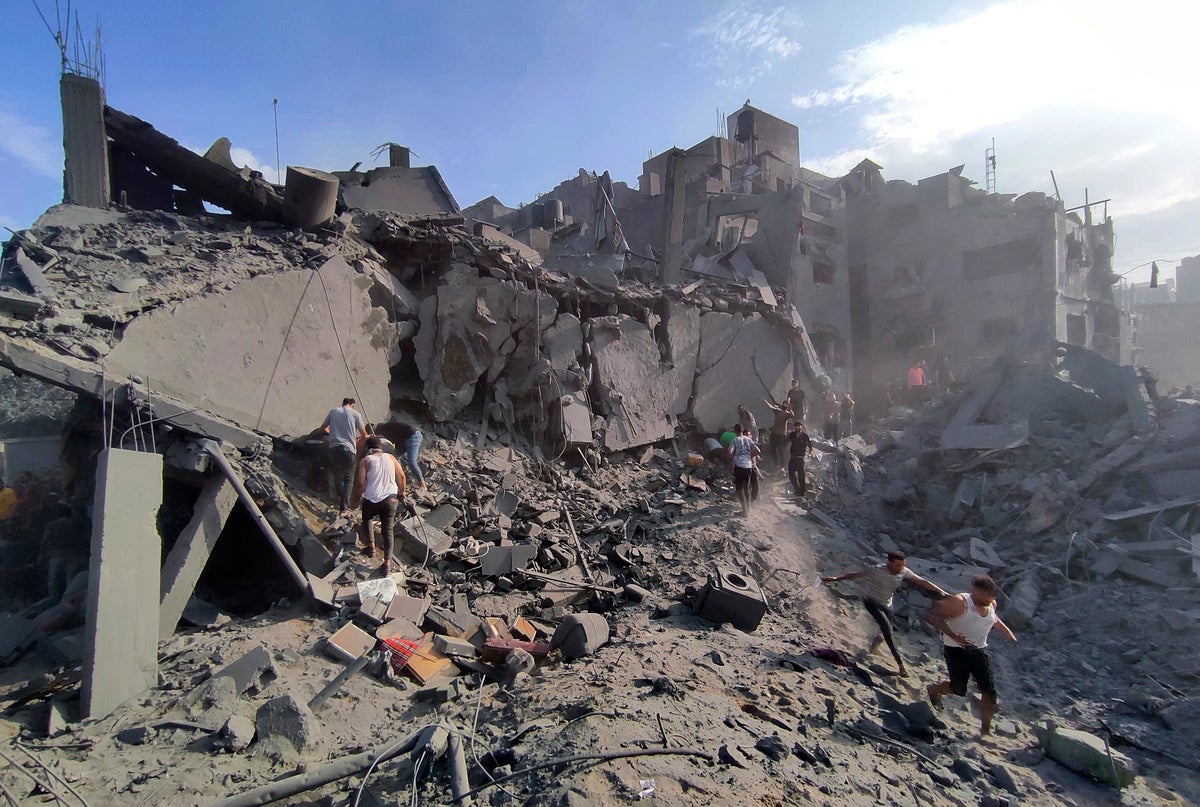
Gaza has been plunged into a second communications blackout as a major Palestinian mobile network said internet and phone lines were down.
Telecoms company Paltel reported a “complete disruption” of internet and mobile phone services in Gaza, marking the second time in five days that residents were largely cut off from the world. Communications also went down over the weekend, as Israeli troops pushed into Gaza in larger numbers.
Humanitarian aid agencies have warned that such blackouts severely disrupt their work in an already dire situation in Gaza, where more than half of the population of 2.3 million Palestinians has been displaced and basic supplies are running low more than three weeks into the war triggered by Hamas' 7 October rampage into Israel.
Attempts to reach Gaza residents by phone were unsuccessful early Wednesday. Internet-access advocacy group NetBlocks.org confirmed that Gaza “is in the midst of a total or near-total telecoms blackout consistent with” the weekend blackout.
Smoke plumes billowing during Israeli bombardment in Gaza— (AFP via Getty Images)
On Tuesday, a barrage of airstrikes levelled apartment buildings in the Jabalia refugee camp near Gaza City, with rescuers frantically digging through the destruction to pull men, women and children from the rubble.
The director of a nearby hospital where casualties were taken, Dr Atef Al-Kahlot, said hundreds of people were wounded or killed, but the exact toll was not yet known.
Israel said the strike, which it claimed targeted senior Hamas military leader Ibrahim Biari, destroyed a militant command centre and an underground tunnel network, and killed dozens of other fighters. Military spokesman Jonathan Conricus said Biari had also been a key planner of the 7 October attack, and that the apartment buildings collapsed only because the underground Hamas complex had been destroyed.
Neither side’s account could be independently confirmed.
Palestinians search for casualties at the site of Israeli strikes on houses in Jabalia refugee camp— (Reuters)
In recent days, Israeli troops have advanced toward the outskirts of Gaza City from the north and east. Israeli officials say Hamas' military infrastructure, including hundreds of kilometres of tunnels, is concentrated in the city, which was home to some 650,000 people before the war.
Israel has been vague about its operations in Gaza, but residents and spokesmen for militant groups say troops appear to be trying to take control of the two main north-south roads.
An estimated 800,000 Palestinians have fled south from Gaza City and other northern areas following Israeli orders to evacuate, but hundreds of thousands remain in the north, including many who left and later returned because Israel is also carrying out airstrikes in the south.
Gaza has been sealed off since the start of the war, causing shortages of food, water, medicine and fuel. Israel has allowed international aid groups to send more than 200 trucks carrying food and medicine to enter from Egypt over the past 10 days, but aid workers say it's not nearly enough.
Israel has barred fuel imports, leading to a territory-wide blackout and warnings from hospitals that their emergency generators may soon shut down, putting patients on life support at risk. Israel says it won't allow fuel to enter because Hamas would confiscate it to use for military purposes.
Palestinians search for survivors at the site of Israeli strikes— (REUTERS)
The strike in Jabalia underlined the anticipated surge in casualties on both sides as Israeli troops advance toward dense residential neighbourhoods. The military confirmed Wednesday that nine soldiers were killed in fighting in northern Gaza, bringing the total of military casualties since the start of the ground operation to 11.
Israel has vowed to crush Hamas’ ability to govern Gaza or threaten it, while also saying it does not plan to reoccupy the territory, from which it withdrew soldiers and settlers in 2005. But it has said little about who would govern Gaza afterwards.
More than 8,500 Palestinians have been killed in the war, mostly women and minors, the Gaza health ministry said Tuesday, without providing a breakdown between civilians and fighters. The figure is without precedent in decades of Israeli-Palestinian violence.
Over 1,400 people have died on the Israeli side, mainly civilians killed during Hamas’ initial attack, also an unprecedented figure. Palestinian militants also abducted around 240 people during their incursion and have continued firing rockets into Israel.







